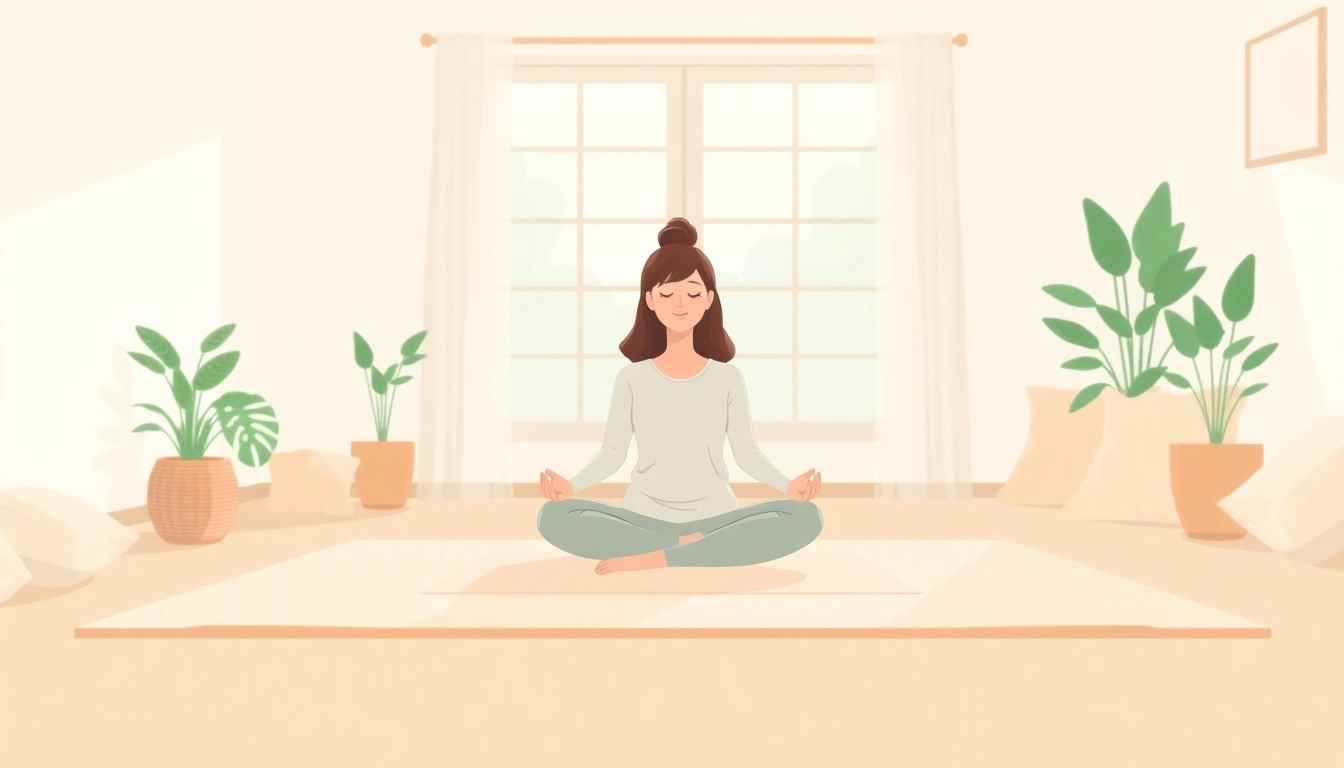Understanding Anxiety and Its Impacts
Defining Anxiety and Its Symptoms
Anxiety is a natural response to stress that can manifest in various forms, often characterized by feelings of worry, fear, and apprehension. While it is a normal part of life to experience anxiety in certain situations, such as speaking in public or facing an important deadline, anxiety becomes a concern when it interferes with daily activities and quality of life.
Symptoms of anxiety can vary widely among individuals but generally include:
- Persistent worry or fear that disrupts day-to-day activities
- Physical symptoms such as increased heart rate, sweating, or trembling
- Difficulty concentrating or focusing on tasks
- Sleep disturbances, including insomnia or restless sleep
- Changes in appetite or weight due to stress
- Feelings of panic or impending doom
For those struggling with these symptoms, it’s crucial to recognize their impact and pursue strategies for dealing with anxiety.
Common Triggers of Anxiety
Identifying the triggers of anxiety is an essential step towards management. Common triggers can include:
- Life Changes: Significant life events such as moving, starting a new job, or ending a relationship can provoke anxiety.
- Stressful Situations: Work-related pressures or family conflicts often elevate anxiety levels.
- Health Concerns: Chronic illness, sudden health changes, or the fear of illness can exacerbate anxiety symptoms.
- Traumatic Experiences: Traumas can lead to anxiety disorders, making certain situations overwhelming.
- Genetics: A family history of anxiety disorders can increase risk.
Understanding these triggers is vital for creating a personalized strategy for coping with anxiety.
The Science Behind Anxiety Disorders
Anxiety disorders are complex conditions that can stem from a combination of psychological, biological, and environmental factors. Neurotransmitter imbalances, particularly involving serotonin and dopamine, play a significant role in the development of anxiety. Additionally, brain structure changes, particularly in the amygdala, which processes fear responses, can contribute to heightened anxiety.
Research indicates that anxiety disorders can affect individuals physically by prompting a repeated fight-or-flight response, which can lead to chronic stress conditions and a range of health problems. Consequently, addressing these scientific underpinnings is critical for effective strategies in dealing with anxiety.
Strategies for Dealing with Anxiety
Relaxation Techniques to Alleviate Symptoms
Relaxation techniques are effective in mitigating the physical and psychological symptoms of anxiety. Popular methods include:
- Meditation: This ancient practice helps reduce stress and promote mental clarity. Mindfulness meditation involves paying attention to the present moment, which can counter anxiety.
- Breathing Exercises: Simple techniques, like the 4-7-8 breathing method, involve inhaling for four seconds, holding for seven, and exhaling for eight seconds to promote calmness.
- Progressive Muscle Relaxation (PMR): This method involves tensing and relaxing different muscle groups to relieve physical tension that often accompanies anxiety.
- Visualization: Imagining a serene setting can serve as a mental escape from anxiety-evoking thoughts.
Utilizing these techniques regularly can be instrumental in dealing with anxiety.
Practical Tips for Daily Management
Incorporating practical strategies into daily routines can significantly support individuals in managing anxiety:
- Time Management: Organizing daily tasks into manageable segments reduces feelings of overwhelm and lowers stress levels.
- Healthy Lifestyle Choices: Maintaining a balanced diet, steering clear of excess caffeine and alcohol, and prioritizing sleep quality all contribute to overall mental well-being.
- Setting Boundaries: Learning to say no can help reduce overcommitment, a known contributor to anxiety.
- Journaling: Writing about emotions and daily experiences can provide insights into triggers and coping mechanisms.
By adopting these daily habits, individuals can create their personalized approach to dealing with anxiety.
Engaging in Physical Activity
Regular physical activity is one of the most effective ways to reduce anxiety levels. Exercise has been shown to relieve stress and increase overall mood. Here are various forms of physical activity that can help:
- Aerobic Exercises: Activities like running, swimming, and cycling release endorphins, which help elevate mood and reduce anxiety.
- Yoga: This mind-body practice combines physical postures, breathing exercises, and meditation, all of which can greatly reduce anxiety symptoms.
- Group Sports: Participating in team sports not only promotes physical fitness but also fosters social connections, which can be beneficial for mental health.
Establishing a consistent exercise routine can be highly advantageous for anyone looking to manage or alleviate their anxiety.
Professional Help for Dealing with Anxiety
When to Seek Therapy
Recognizing the need for professional help can be challenging. Individuals should consider seeking therapy if they experience:
- Intense anxiety that interferes with day-to-day responsibilities
- Inability to manage anxiety through self-help techniques
- Physical symptoms, such as panic attacks, that hinder normal functioning
- Feelings of hopelessness, despair, or suicidal thoughts
Reaching out for professional assistance is a vital step in dealing with anxiety.
Types of Therapeutic Approaches
There are various forms of therapy that can assist in managing anxiety effectively, including:
- Cognitive Behavioral Therapy (CBT): Focusing on changing negative thought patterns and behaviors, CBT equips individuals with practical tools to cope with anxiety.
- Exposure Therapy: This approach gradually exposes individuals to anxiety-inducing situations, helping them build tolerance and develop coping strategies.
- Mindfulness-Based Therapy: Integrating mindfulness practices, this therapy helps individuals stay grounded and present, mitigating anxious feelings.
Understanding different therapeutic modalities can be helpful when exploring options for dealing with anxiety.
The Role of Medication in Treatment
For some individuals, medication may be a necessary part of treatment. Common classes of medications used to treat anxiety include:
- Selective Serotonin Reuptake Inhibitors (SSRIs): These help increase serotonin levels in the brain, providing relief from anxiety symptoms.
- Serotonin Norepinephrine Reuptake Inhibitors (SNRIs): Similar to SSRIs, these also target serotonin but additionally affect norepinephrine levels.
- Benzodiazepines: Used for short-term treatment, these medications can provide rapid relief from acute anxiety symptoms.
Consulting with a healthcare provider is essential to determine the most appropriate medication and to monitor potential side effects.
Building a Support System
Communicating with Loved Ones
Open communication with friends and family can play a crucial role in managing anxiety. Sharing feelings helps to reduce feelings of isolation and provides an opportunity for support. Tips for effective communication include:
- Being honest about your feelings and experiences
- Expressing needs for support, whether emotional or practical
- Encouraging loved ones to ask questions and learn about anxiety
By fostering strong connections, individuals can create a supportive environment conducive to dealing with anxiety.
Finding Support Groups
Support groups provide a space for individuals to share experiences and learn from others who understand what they are going through. Benefits of joining such groups include:
- Access to shared resources and coping strategies
- The ability to express feelings in a non-judgmental environment
- Networking and forming connections with others facing similar struggles
Finding the right support group can enhance your ability to manage and cope with anxiety effectively.
The Importance of Community Resources
Community resources can provide valuable assistance in managing anxiety. Local organizations, mental health clinics, or hotlines often offer:
- Educational resources about mental health
- Workshops focusing on stress management and relaxation
- Access to trained counselors or therapists
Utilizing these resources can further aid individuals in their journey of dealing with anxiety.
Long-Term Management Strategies for Dealing with Anxiety
Setting Achievable Goals
Goal setting is critical for progress in managing anxiety. Setting achievable and realistic goals can provide a sense of accomplishment and motivation. Consider the following strategies:
- Break Large Goals into Smaller Steps: This approach creates a clear pathway and makes seemingly insurmountable tasks manageable.
- Track Your Achievements: Keeping a log of accomplishments can serve as a reminder of progress made and motivate continued effort.
- Be Flexible: Adjust goals as needed to reflect changing circumstances and ensure they remain attainable.
This ongoing process enhances self-efficacy in dealing with anxiety.
Tracking Progress and Adjusting Tactics
Regularly tracking progress is essential for long-term management of anxiety. Consider the following methods:
- Maintain a Diary: Documenting anxiety levels, triggers, and coping strategies can provide insights into patterns and effective techniques.
- Review and Reflect: Periodically reviewing your entries can help identify what strategies work best and what needs adjustment.
- Consult with Professionals: Regular check-ins with therapists or counselors can provide external perspectives on your progress.
Adjusting tactics based on insights gathered will promote effective strategies for dealing with anxiety.
Practicing Mindfulness and Self-Compassion
Mindfulness and self-compassion are potent tools in managing anxiety. Incorporating the following practices can foster resilience:
- Mindful Breathing: Paying attention to your breath can ground you in moments of heightened anxiety.
- Self-Compassion Exercises: Practicing kindness towards yourself during tough times helps reduce self-criticism and promotes emotional healing.
- Engagement in Mindful Activities: Activities like art, gardening, or walking can cultivate presence and redirect anxious thoughts.
Integrating mindfulness and compassion into your life can significantly enhance your ability to manage dealing with anxiety.



